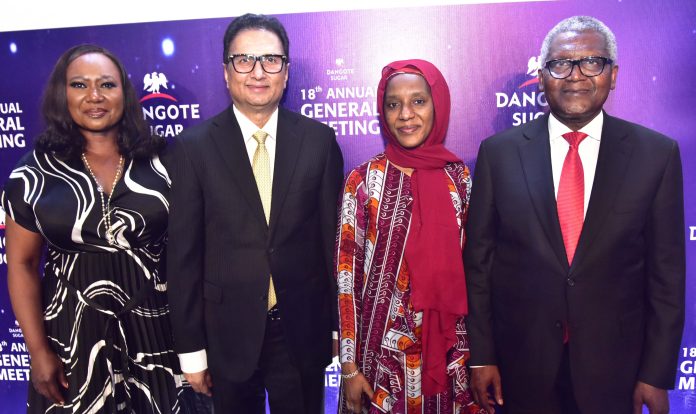Aliko Dangote Foundation tasks faith leaders on malnutrition and hunger within Nigeria
The Aliko Dangote Foundation (ADF) has underscored the pivotal role of religious and traditional institutions in tackling the pressing issues of malnutrition and hunger within Nigeria.
Speaking at an event organized by the National Council on Nutrition and the World Bank-Assisted Accelerating Nutrition Results in Nigeria Project, Mrs. Zouera Youssoufou, the Managing Director/Chief Executive Officer of Aliko Dangote Foundation, emphasized the significance of faith-based groups in the national agenda for improving nutrition and human capital development in Nigeria.
During the high-level dialogue on nutrition at the Presidential Villa in Abuja, themed ‘Faith Leaders as Catalysts for Enhanced Human Capital Through Nutrition,’ Mrs. Youssoufou highlighted that nutrition goes beyond mere sustenance; it is about nurturing the body, mind, and spirit. She emphasized that adequate nutrition forms the cornerstone of human capital development.
Mrs. Youssoufou painted a grim picture of the situation in Nigeria, where malnutrition significantly hampers the nation’s progress. She pointed out that children are particularly vulnerable, suffering from stunted growth, cognitive impairments, and increased susceptibility to diseases due to inadequate nutrition.
She stressed that malnutrition’s consequences extend beyond physical health to affect educational achievements, economic productivity, and overall well-being. Urgent and concerted action from all sectors of society is imperative to address this crisis.
Mrs. Youssoufou highlighted the unique position of faith leaders, with their grassroots reach and influence, in driving positive change in nutrition.
She said their teachings on compassion, justice, and stewardship can inspire individuals to prioritize good nutrition, support vulnerable populations, and advocate for policies promoting food security.
By leveraging the collective power of faith communities, Mrs. Youssoufou proposed fostering a culture of health and wellness that values nutritious diets, breastfeeding, and access to essential nutrients. She suggested educational programs, awareness campaigns, and community engagement to empower individuals to make informed dietary choices.
Moreover, she emphasized the role of faith leaders as advocates for policy changes to address systemic barriers to good nutrition, such as food insecurity and inequitable access to healthcare services.
She added that by advocating for greater investment in nutrition-sensitive programs, they can create an enabling environment for improving health outcomes nationwide.
The dialogue aimed to facilitate the sharing of insights, best practices, and innovative solutions among faith leaders to drive progress in nutrition and human capital enhancement in Nigeria.
It called for unity transcending religious divides to work towards a healthier, more prosperous nation.
The host of the event, Vice President Kashim Shettima, stressed the indispensable role of faith and traditional leaders in improving nutrition within their communities.
“Your influence is indispensable. We believe that, regardless of the quality of ideas we bring to the table, our efforts will fall short without your participation and endorsement,” he said.
The VP stressed that Nigeria’s future readiness hinges not just on food abundance but on the nourishing quality of its food supply.
“We must proclaim to the world that our commitment to producing food of unparalleled richness is not rhetoric,” Shettima declared, noting that “this gathering is a solemn pledge to safeguard our well-being and preserve the legacy of generations yet to come,” he added.
He restated President Bola Tinubu’s commitment to prioritizing nutrition as part of Nigeria’s food security drive.
Earlier, the Minister of Budget and Economic Planning, Atiku Bagudu, said malnutrition and related challenges have over the years negatively impacted human capital development, requiring accelerated interventions.
The Minister described the efforts and interventions of the National Economic Council (chaired by the Vice President) and the engagement with faith-based leaders as testimonies that Nigeria has the institutional mechanism to combat hunger and malnutrition with their associated challenges.
On his part, Coordinating Minister of Health and Social Welfare, Prof. Muhammad Pate, said the engagement with faith-based leaders was not just a dialogue but a clarion call for action to address one of society’s most disturbing challenges.
Prof. Pate called on religious and traditional leaders in Nigeria to leverage their network and influence in society to support the government in combating hunger and malnutrition, describing faith-based leaders as the backbone of their communities, hence their importance in improving the nutritional outcomes in their various domains.
The Sultan of Sokoto, Muhammadu Sa’ad Abubakar III, and the President of the Christian Association of Nigeria, Dr. Daniel Okoh, pledged the commitment of their communities and congregations to the efforts to combat hunger and malnutrition in the country, stating that their presence at the event underscored their loyalty to the campaign.






